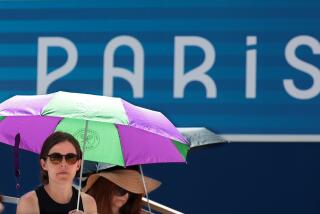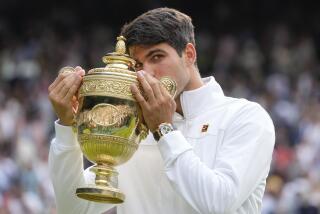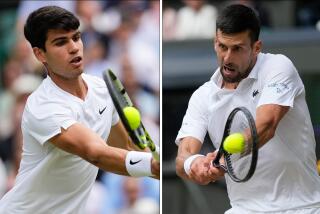All is not lost for the others at French Open
- Share via
PARIS — In brazen defiance of the many who crave another donnybrook between No. 1 Roger Federer and No. 2 Rafael Nadal, 126 other men have insisted upon playing singles in this French Open.
The tournament has let them. It has even charged steep euro for people to see them at Roland Garros. With unmitigated gall, the other 126 persisted in walloping tennis balls, apparently unaware of their own discourtesy.
Many have cooperated with the Federer-Nadal ideal by losing, including the six who lost to the two men in the minimum 18 sets, plus half of the world’s top 10 players and all nine of the clay-allergic Americans, who knew their place and went quickly.
Fourteen of the other 126, however, still won’t agree to leave, becoming the other 14. They include three Russians and three Spaniards besides Nadal.
They also include an aged former French champion (Carlos Moya, 30), an even older Swedish workhorse (Jonas Bjorkman, 35), an Argentine who beat Federer twice this year (Guillermo Canas), an Italian who beat Federer on clay in Rome (Filippo Volandri), and the world’s 127th-ranked player (Igor Andreev, Andy Roddick’s conqueror).
Yet on their way to whittling themselves to 14, something unexpected happened Saturday, something that actually might linger in French Open memories.
They staged a donnybrook.
The third-round match between No. 6-ranked Serb Novak Djokovic, presumed to be the greatest threat to the Federer-Nadal daydream, and No. 129 Olivier Patience of France didn’t figure to wind up sounding like a raucous soccer thing and embed itself in memory banks. It pitted Djokovic, a rising 2006 quarterfinalist, against a 27-year-old who’d seen only one third round in 10 previous Grand Slams.
But then it went for four hours and for five sets. And it proved how hard it can be to beat a man named Patience on French clay.
And it wound up with the loser, Patience, saying, “The ambience was unbelievable.”
As Djokovic arrived at Roland Garros’ second-most-prominent court, Court Suzanne Lenglen, he figured he’d face the last Frenchman in the draw. He might’ve even known that France’s most famous player, reigning Wimbledon champion Amelie Mauresmo, had lost earlier in the day in the women’s third round to Lucie Safarova of the Czech Republic, deepening her long French melodrama of 13 appearances with zero titles and even zero semifinals.
He probably didn’t know Mauresmo never felt right at this tournament, never expected much of it, felt pain in her adductor muscles and said, “So the fact is that there’s no miracle today.”
But he knew French fans might feel some urgency.
Still, he couldn’t have imagined football songs rewritten for “Olivier,” or repeated chants of “Olivier,” or that one lout in the upper deck repeatedly would let out a shrill sound just after Djokovic would net a first service.
He would look up there a few times, point once and finally get the chair umpire to tell the spectator to fermez la bouche.
“If you’re playing against a French guy and against 10,000 people screaming for him every point, I don’t think you feel really nice and excited,” said Djokovic, 20, a 2007 finalist at Indian Wells and champion at Key Biscayne.
If you’re playing against a French guy and he’s 27 years old and 129th in the world but playing like a maestro, dominant on his serve and winning the second and third sets by 6-2 and 6-3, well, the noise only mushrooms.
Fans gave golf applause for Djokovic’s points and soccer roars for Patience’s, even as they showed appreciation when Djokovic twice overruled line calls that had gone in his favor and conceded the points to Patience.
The whole thing drifted into a fourth-set tiebreaker, the tension swelling especially during Djokovic’s service games, which he extends by bouncing the ball an unusual number of times before winding up. His unofficial record reached 21 bounces as the match momentarily occluded thoughts of whether, eight days away, Federer might become the first player since Rod Laver in 1969 to hold all four Grand Slam titles, or whether Nadal might burnish his Roland Garros record to 21-0.
Djokovic weathered that tiebreaker by 7-4, then a love-40 disadvantage and attending shouts and chants at 3-3 in the fifth.
“He didn’t give me one point at the very important moments, so that’s why I think he’s ranking No. 5, no?” Patience said.
Technically, No. 6, but when Djokovic broke for 5-3, he did his very own high leap-in-place as if he ranked No. 129. When he quashed a break point with an ace then clinched it, 7-6 (2), 2-6, 3-6, 7-6 (4), 6-3, he did a 360 and shouted out to his tormenters.
Then he hugged Patience and, as the Frenchman took a seat, walked out to the court, pointed back to Patience and urged the crowd to applaud him again.
The crowd complied, and Djokovic later said Patience “deserves to be a much higher-ranked player,” and Patience later wished he could “go back out on the court.”
All told, quite a moment for the other 126.
*
(BEGIN TEXT OF INFOBOX)
French Open
Highlights from Day 7:
* Better with age: Jonas Bjorkman is using his age to his advantage.
The 35-year-old Swede beat Oscar Hernandez of Spain, 6-7 (3), 6-3, 6-0, 6-1, Saturday to become the oldest man in the French Open’s fourth round since 38-year-old Nicola Pietrangeli in 1972.
Bjorkman credits his recent success to a more relaxed attitude -- and a more intelligent approach.
“I guess you get brighter,” he said. “I managed to tactically play, maybe, a little bit smarter than I have in the past.”
Bjorkman now meets 30-year-old Carlos Moya of Spain, who beat Juan Pablo Brzezicki of Argentina, 6-1, 6-3, 7-5.
* Today’s top matches: Dinara Safina (10), Russia, vs. Serena Williams (8); Roger Federer (1), Switzerland, vs. Mikhail Youzhny (13), Russia; Justine Henin (1), Belgium, vs. Sybille Bammer (20), Austria; Patty Schnyder (14), Switzerland, vs. Maria Sharapova (2), Russia.
More to Read
Go beyond the scoreboard
Get the latest on L.A.'s teams in the daily Sports Report newsletter.
You may occasionally receive promotional content from the Los Angeles Times.










